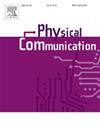REAFL: Accelerating federated learning with personalized iteration allocation and peer learning
IF 2.2
4区 计算机科学
Q3 ENGINEERING, ELECTRICAL & ELECTRONIC
引用次数: 0
Abstract
In recent years, federated learning (FL) has made significant promise for wireless communication edge computing (WCEC) environments. However, challenges like device heterogeneity, limited edge resources, and Non-IID data disrupt symmetry in data distribution and model updates, which is crucial FL efficiency and performance. To address these issues, we propose Resource-Efficient Accelerating Federated Learning (REAFL), which combines Particle Swarm Optimization (PSO) and Momentum Gradient Descent (MGD) to enhance model training efficiency while maximizing resource utilization in WCEC environments. Our approach innovatively leverages PSO’s inherent self-learning and peer-learning capabilities to facilitate robust local model training on individual devices, subsequently refined by MGD optimization. Through a clear toy example, we demonstrate the importance of dynamically adjusting the local iteration quantities for heterogeneous devices during FL training. Theoretical analysis of REAFL’s convergence under a fixed time budget reveals the relationship between local iteration quantities and the optimal global model. Building on this, we propose a novel FL framework to dynamically adjust the local iteration quantities for devices. Extensive experiments show that REAFL outperforms existing benchmarks, offering improvements in accuracy, resource efficiency, and resilience to Non-IID data distributions.
REAFL:通过个性化迭代分配和同侪学习加速联邦学习
近年来,联邦学习(FL)为无线通信边缘计算(WCEC)环境做出了重大承诺。然而,设备异构、有限的边缘资源和非iid数据等挑战破坏了数据分布和模型更新的对称性,这对FL的效率和性能至关重要。为了解决这些问题,我们提出了资源高效加速联邦学习(REAFL),它结合了粒子群优化(PSO)和动量梯度下降(MGD)来提高模型训练效率,同时最大限度地提高WCEC环境下的资源利用率。我们的方法创新性地利用了粒子群算法固有的自我学习和同侪学习能力,以促进在单个设备上进行强大的局部模型训练,随后通过MGD优化进行改进。通过一个简单的例子,我们证明了在FL训练过程中动态调整异构设备的局部迭代量的重要性。对REAFL在固定时间预算下的收敛性进行了理论分析,揭示了局部迭代量与全局最优模型之间的关系。在此基础上,我们提出了一种新颖的动态调整局部迭代量的FL框架。大量的实验表明,REAFL优于现有的基准测试,在准确性、资源效率和对非iid数据分布的弹性方面提供了改进。
本文章由计算机程序翻译,如有差异,请以英文原文为准。
求助全文
约1分钟内获得全文
求助全文
来源期刊

Physical Communication
ENGINEERING, ELECTRICAL & ELECTRONICTELECO-TELECOMMUNICATIONS
CiteScore
5.00
自引率
9.10%
发文量
212
审稿时长
55 days
期刊介绍:
PHYCOM: Physical Communication is an international and archival journal providing complete coverage of all topics of interest to those involved in all aspects of physical layer communications. Theoretical research contributions presenting new techniques, concepts or analyses, applied contributions reporting on experiences and experiments, and tutorials are published.
Topics of interest include but are not limited to:
Physical layer issues of Wireless Local Area Networks, WiMAX, Wireless Mesh Networks, Sensor and Ad Hoc Networks, PCS Systems; Radio access protocols and algorithms for the physical layer; Spread Spectrum Communications; Channel Modeling; Detection and Estimation; Modulation and Coding; Multiplexing and Carrier Techniques; Broadband Wireless Communications; Wireless Personal Communications; Multi-user Detection; Signal Separation and Interference rejection: Multimedia Communications over Wireless; DSP Applications to Wireless Systems; Experimental and Prototype Results; Multiple Access Techniques; Space-time Processing; Synchronization Techniques; Error Control Techniques; Cryptography; Software Radios; Tracking; Resource Allocation and Inference Management; Multi-rate and Multi-carrier Communications; Cross layer Design and Optimization; Propagation and Channel Characterization; OFDM Systems; MIMO Systems; Ultra-Wideband Communications; Cognitive Radio System Architectures; Platforms and Hardware Implementations for the Support of Cognitive, Radio Systems; Cognitive Radio Resource Management and Dynamic Spectrum Sharing.
 求助内容:
求助内容: 应助结果提醒方式:
应助结果提醒方式:


